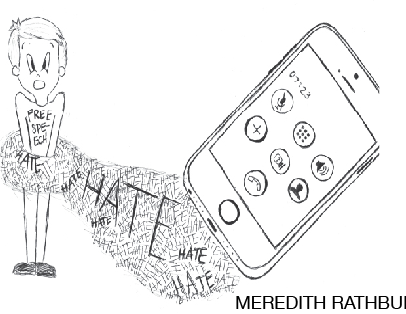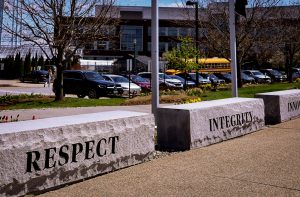FREE SPEECH & HATE SPEECH: A dialogue exploring the gray area in our First Amendment rights
November 17, 2017
James
After a continuing education student, Wesley Richter, was charged with disorderly conduct after being accused of using racist and threatening language, the debate of free speech versus hate speech is in the spotlight.
It is undeniable that the First Amendment protects even the most hateful statements.
In June, the Supreme Court ruled unanimously in Matal v. Tam that the Patent and Trademark Office’s rejection of a trademark containing a racial slur was a violation of the First Amendment, stating that so-called “hate speech” is constitutionally protected.
However, threats are not as black and white.
In Elonis v. U.S., the Supreme Court ruled that in order to prosecute someone for making a threat, it must be proven that the person intended to cause the target to fear death or injury.
Whether or not Richter intended to instill fear is for the judge to decide. However, I question whether such intent existed given that the statement was allegedly made during a phone conversation and overheard by a third party.
It is important to remember that the right to free speech belongs to everyone, even to those whom the majority finds despicable.
As evil and disgusting as racism is, the government does not have the authority to censor unpopular or offensive speech.
Henry
As Abraham Lincoln said in an 1858 speech, “A house divided against itself cannot stand.”
This hasn’t changed.
Yes, the government has no authority to censor content for hurt feelings, but we should not act like everything is fine as it is.
The Southern Poverty Law Center currently lists 917 legal hate groups in the U.S. Our current President Donald Trump ran for his position in 2016 on an inflammatory and strongly anti-Islam campaign and won with it.
Organizations can deny health benefits for religious reasons as opposed to medical ones.
Clearly, our responsibility was undeserved.
If the majority of people oppose these hate groups and racist comments that plague our nation, shouldn’t we be able to restrict this sort of behavior?
People like Wesley Richter make such comments because despite rhetoric that racism is bad, the First Amendment enables them to continue.
The more diverse a society becomes, the more tension will grow within it, just like what has developed in the U.S. over the past 200 years.
In a 2016 Washington Times article Dr. Owen Anderson argues the importance of the First Amendment.
“It guarantees the freedom essential to humans as rational beings,” he said.
Sadly, nothing is rational about bigotry.
If these problems could be solved by conversation, we wouldn’t have had a Civil War or the Civil Rights Movement.
Therefore, hate speech must be denounced in the Constitution if we are to ever get past our racism problem.
James
The Constitution was carefully set up to protect against the tyranny of the majority.
By suggesting that the majority can restrict hate speech, one is suggesting that the rights of the minority exist on the whim of the majority and can be rescinded with a vote.
Such a suggestion is repugnant to the principles set forth by the Constitution.
Even though most are opposed to hate groups, the right to peacefully assemble and speak freely must be protected.
The fundamental rights safeguarded by the Bill of Rights belong to everyone, not just the majority.
Just as if the majority were to approve of slavery, that would not make it permissible because doing so would infringe on the rights of those enslaved.
Constitutional rights are not up for debate and do not depend on the opinions of the majority.
Restricting the right to free speech on the grounds of protecting people’s feelings would set an extremely dangerous precedent.
Henry
The Constitution was set up to protect us against the uneducated masses, but what good is a Constitution if it does not protect the interest of the general public?
Did our founding fathers write the perfect legal document that will never need to be changed?
Of course not.
Since its conception, 17 amendments have been added to the Constitution.
This is because the Constitution was written over 200 years ago and society has changed a lot since then.
Slavery was legal and constitutional until the majority could no longer tolerate having it be a part of their lives, and it was consequently abolished.
We enacted, then repealed the 18th Amendment on prohibition because it did not align with our ideals.
Every time you defend someone’s speech solely out of constitutionality, you are admitting that they represent the fundamental values of our nation.
Racism is something we can fix.
We either accept that racism is something we wholeheartedly condone in America, or we admit we were wrong and do something about it.







